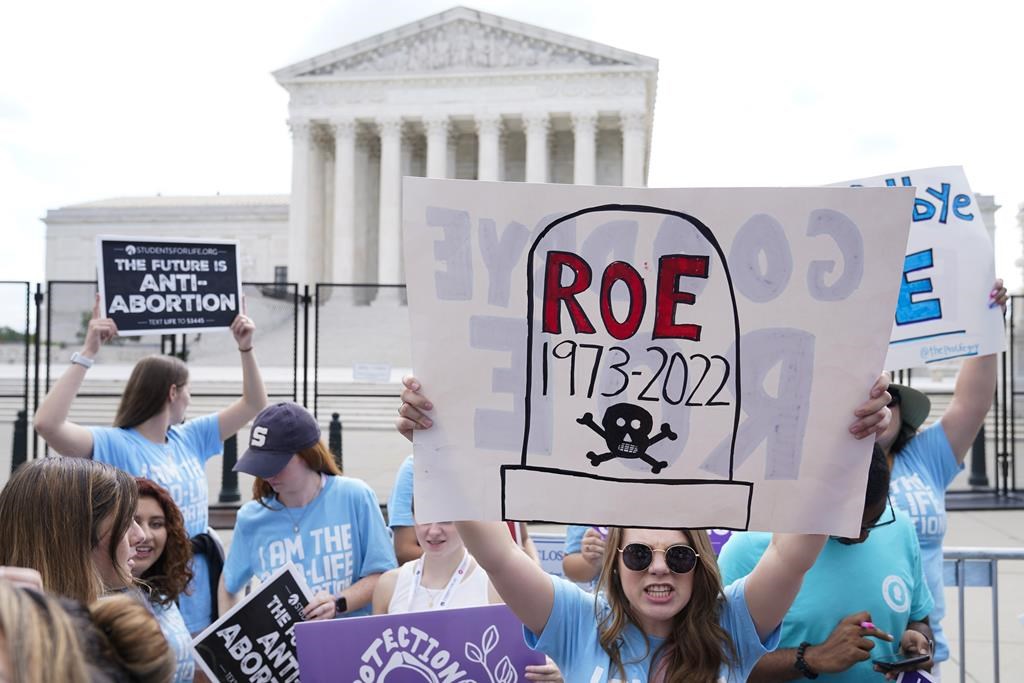The Women’s Health Clinic in Winnipeg says it’s “shocked and appalled” over the U.S. Supreme Court’s decision to overturn Roe v. Wade, the decades-old ruling that guaranteed women the right to abortion in that country.

The top court overturned the precedent-setting decision set in 1973 on Friday.
“I think we all hoped that it wouldn’t actually happen,” said Kemlin Nembhard, executive director of the Women’s Health Clinic, noting a draft of the decision leaked to media earlier this year meant the ruling wasn’t as surprising as it would have been otherwise.
“But even with that preparation, I’m still shocked and appalled. It’s absolutely unbelievable.”

The decision, unthinkable just a few years ago, was the culmination of decades of efforts by abortion opponents, made possible by an emboldened right side of the court that has been fortified by three appointees of former president Donald Trump.
The ruling is expected to lead to abortion bans in roughly half the states.
“To me, the States is just going back to being in the 1800s … when you’re talking about rights for women,” Nembhard told 680 CJOB shortly after the decision was announced.
“You can’t tell me that this is a reflection — a modern-day reflection — of what the American population feel.”
Public opinion surveys in the U.S. have shown a majority of Americans oppose overturning Roe and handing the question of whether to permit abortion entirely to the states. Polls conducted by The Associated Press-NORC Center for Public Affairs Research and others also have consistently shown about one in 10 Americans want abortion to be illegal in all cases.

Get weekly health news
Prime Minister Justin Trudeau quickly slammed the ruling Friday, calling it “horrific” and promising to defend abortion rights in Canada and around the world.
But Nembhard still worries about the repercussions the U.S. decision may end up having in Canada.
The right to an abortion doesn’t exist in Canada in the same way it was enshrined in Roe v. Wade. Abortion is decriminalized in Canada because of a 1988 Supreme Court decision, but no bill has ever been passed to enshrine access into law.
Last year a majority of Conservatives voted in favour of a private member’s bill to outlaw sex-selective abortions, although the bill was ultimately defeated.
“We can never underestimate the impact of that sort of rhetoric from the States has on on our conversations here,” Nembhard said.
Nembhard is also worried about Manitoba’s proximity to States that plan to ban abortions — and what that may mean for Canadian abortion providers like the Women’s Health Clinic.
“We may be inundated with people coming to us seeking abortions,” she said.

“Let’s say, if they’re from North Dakota? Do they want to drive to Minnesota or drive to Manitoba? If they’re from South Dakota, (will) they want to fly to California or Colorado?”
Women’s Health Clinic spokesperson Kristen Einarson said access to surgical abortions can be already difficult for Manitoba women who don’t live near Winnipeg or Brandon.
And the Winnipeg clinic is already performing 25 to 30 per cent more abortions than they are funded for, she adds.
“We already have a demand that exceeds what we receive money for,” Einarson said.
“We will provide abortion care to anyone who needs it, but it is just an axis of how much can we do when we are already … past our limit.”
Abortion rights advocates in Canada have warned that the inconsistent level of access to abortion in Canada could be disrupted if American women come north for care unless the health-care system here is bolstered to improve gaps in abortion access.

“It’s important to keep in mind that we are 1/10 the population of the States. So there’s no way that in Canada we could actually meet the need that they have if people just decided to, you know, come north,” Nembhard.
“(That) doesn’t mean that we’re going to turn anybody away. We wouldn’t do that. But I think we need to be realistic and look at that.
“From a diplomatic perspective, I think that’s something that our diplomats should be talking to and our government should be talking to the states about.”
— with files from Amanda Connolly and The Canadian Press









Comments